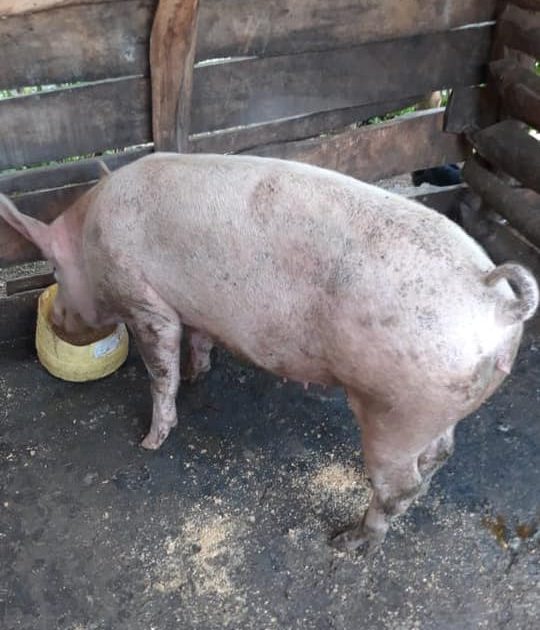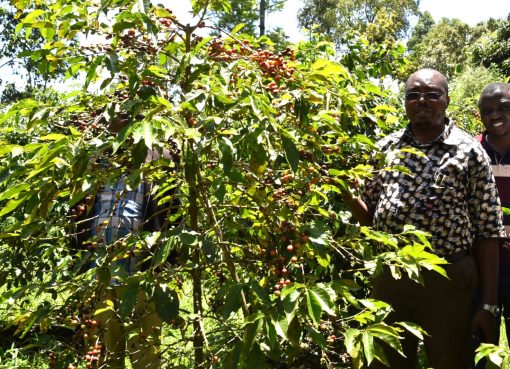Pig Farmers in Kakamega and the larger Western region, have been encouraged to adopt exotic breeds which are best for commercial purposes.
The County Officer in charge of Pig farming and Agribusiness in Kakamega, Henry Ondanga, encouraged pig farmers to visit a Pig Multiplication Centre located at Bukura Agricultural Training College (ATC) where they can obtain highbrid piglets.
The Bukura Pig Multiplication Center currently produces highbrid piglets of Landrace and the Large White exotic breeds.
He said plans are underway to introduce more Duroc exotic breeds next year to increase the number of exotic breeds available for farmers to adopt. Some farmers already have the Duroc breed in the county.
The county is also looking for the Large Black Pig to introduce to farmers as it gears towards empowering them to commercialize their farming enterprises.
“We are in the process of introducing two high breeds at the Bukura ATC Multiplication Centre to increase more options for our pig farmers,” he added.
Speaking to KNA on Wednesday, Ondanga noted the department is aware of the current needs to make farmers shift from indigenous breeds to exotic breeds and is in the process of ensuring the breeds are made available.
At the moment, farmers can obtain high bred piglets, which are eight weeks old at a cost of Sh 3,000 at the Bukura ATC Multiplication Centre.
The county is also scheduled to hold a stakeholders meeting bringing together butchers, pig keepers and other players in the value chain to sensitize them on the available new breeds.
He says few farmers have adopted the Duroc breed but hopes most will uptake after they are sensitized and the breeds introduced in the multiplication centre.
Among those who have adopted the Duroc breed is a prominent farmer who owns Boresha Farm at Lunza Village in Kakamega County, along the Sabatia-Sigalagala road. The farmer also rears chicken in a well-structured modern farm.
Ondanga disclosed, farmers have expressed an interest in shifting from indigenous to exotic breeds. He encouraged others who want to venture into pig farming to adopt high breeds. At the moment, the county has more than 90,000 pigs.
The County Government is also finalizing the establishment of a pig factory at Ikolomani which once commissioned will process pork to other by-products.
This comes following a training of pig farmers that was conducted in September this year by an expert in pig feed formulation from the Pork Producers Association of Kenya (PPAK), Mr Paul Akhabele, on profitable pig farming.
Akhabele urged pig farmers from Western region to shift from indigenous pigs to exotic ones to make more money.
He said exotic pigs grow fast, have good feed conversion rate and attain weight faster and can produce of upto 20 piglets at-ago.
Akhabele said a pig is an animal that can be used to attain the Kenya Vision 2030 and even address Food Security. He says the association is working with other stakeholders to change the mindset of most Western Region residents from an employee to an entrepreneurial mindset.
He noted that lack of an organized market for pork, poor farming practices and reluctance to adopt high breeds as a major setback among pig farmers from Western Kenya.
A research published at the Nordic Journal of African studies titled ‘Farmer Perceptions on Indigenous Pig Farming in Kakamega’ set out to find out why the local breed was still predominant among farmers despite calls to introduce better exotic breeds in Western Kenya.
The research was conducted at Ikolomani and Shinyalu areas dominated by the Idakho and Isukha subtribes of the Luhya community due to their popularity in pig farming.
The research published in 2010 determined that most farmers still kept pigs in a free range due to low input requirement as compared to expenses required for raising exotic breeds.
The study came to a conclusion that in order to improve pig farming in Western Region, there was a need for equipping farmers with basic knowledge and skills, improving marketing and provide access to credit facilities.
The International Livestock Research Institute (ILRI) and the University of Nairobi are among other institutions that have researched on pig farming in Western Kenya.
ILRI researched on improved pig production and health in Western Kenya, between Jan 2007 to July 2009. It also researched on indigenous pig management practices in Western Kenya in 2011.
On its part, The University of Nairobi carried out a research in 2011 on opportunities for improved pig farming in Western Kenya.
By Moses Wekesa




